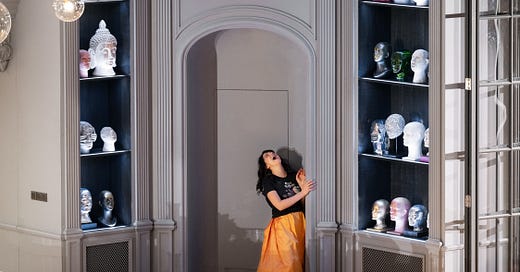Salome on the Verge of a Nervous Breakdown
Asmik Grigorian sings Strauss's anti-heroine in a bloodless Hamburg staging
Spoilt for choice: Asmik Grigorian’s remarkably sung and acted Salome Picture by Monika Rittershaus
Before Asmik Grigorian made her sensational debut as Richard Strauss’s gruesome, spoilt-child Salome at the 2018 Salzburg Festival, she was already an experienced singer, above all in her native Lithuania. Then she was catapulted into the limelight as a member of Barrie Kosky’s Komische Oper ensemble, where she sang a variety of increasingly prominent roles: her acclaimed Tatyana in his production of Yevgeny Onegin marked her British debut at the Edinburgh Festival in 2019, by which time her Salzburg Salome, revived earlier that summer, had made her an international star.
I missed both performances, but when I did eventually see her as Puccini’s Manon Lescaut later in 2019, it was clear that Grigorian was a singing actor of exceptional gifts and almost limitless versatility (she has already sung Bellini’s Norma). Her voice - slender, penetrating even in pianissimo phrases - is not an exceptionally large instrument, but it has uniquely affecting sound and projection, confirmed by more recent performances as Dvorak’s Rusalka (Madrid), Strauss’s Chrysothemis (in Salzburg) Tchaikovsky’s Enchantress (Frankfurt), Janáček’s Jenufa (Covent Garden) and Verdi’s Lady Macbeth (Salzburg last summer). Her upcoming assignments later this season include Turandot (Vienna), Jenufa in concert with Simon Rattle and the London Symphony Orchestra, Butterfly (The Royal Opera) and Lisa in Tchaikovsky’s The Queen of Spades (Munich). The variety and different technical demands of this repertoire make Grigorian all the more singular an artist, and special.
Her success as Lady Macbeth demonstrated that her versatility derives from a solid vocal technique - possibly inherited from her father, the distinguished Armenian tenor Gegam Grigorian, a stalwart of Valery Gergiev’s Kirov/Mariinsky Opera, and taught her by her mother, Lithuanian soprano Irena Milkevičiūtė. Her histrionic prowess is the equal of her vocal prowess: now 42, she is still able to incarnate juvenile roles such as Salome and Manon Lescaut, but her experience during an almost 20-year career brings depth to her portrayals of tragic protagonists and anti-heroines. As an actor, she is one of the most compelling artists in opera today.
Keep reading with a 7-day free trial
Subscribe to Operalogue to keep reading this post and get 7 days of free access to the full post archives.




